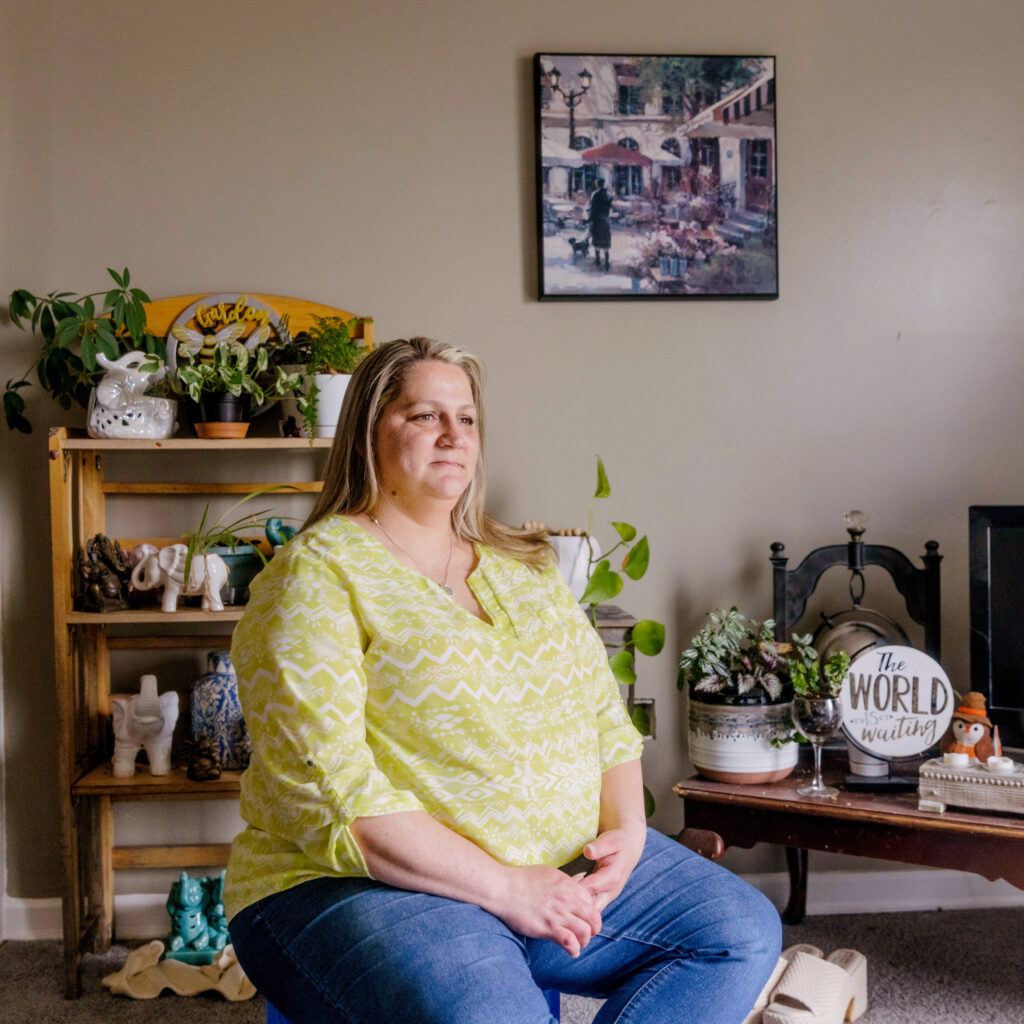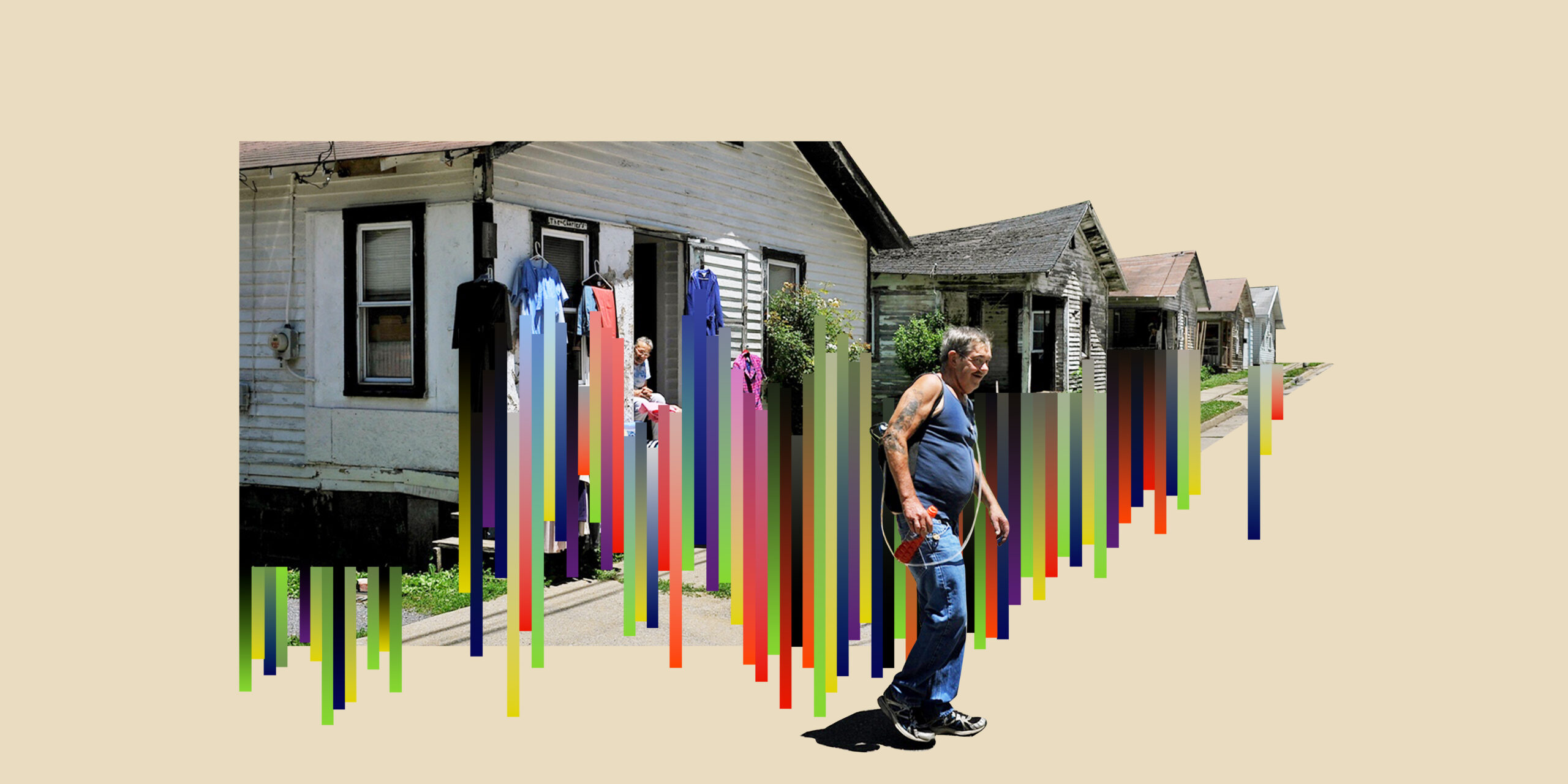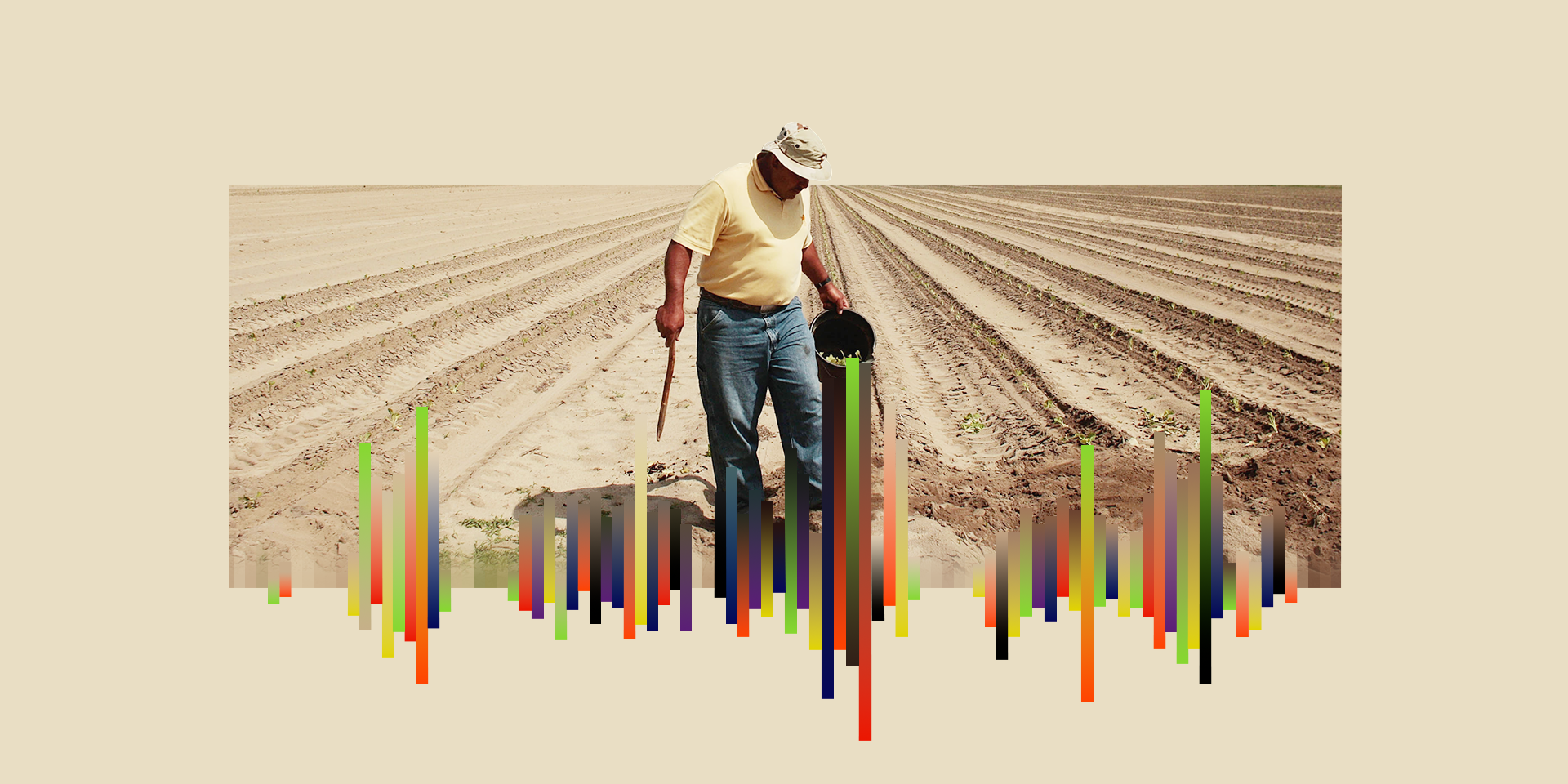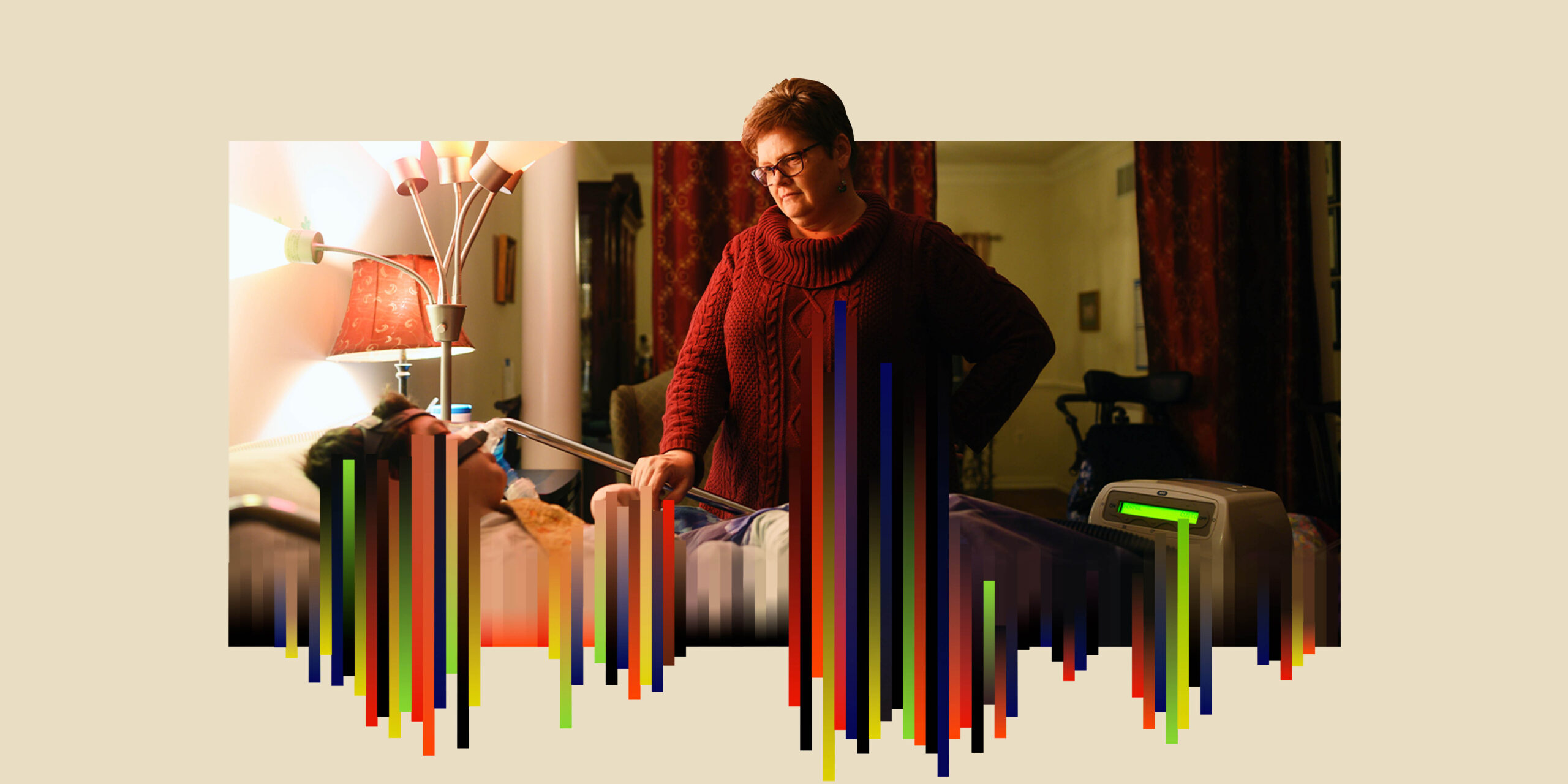Editor’s note: This is the fourth story in the “Cuts & Consequences” series about the effects that federal spending reductions would have on people living in the Deep South.
For 10 years, Amanda Smith bounced between friends’ living room couches, her mother’s home, apartments and prison. Suffering with substance use disorder for 25 of her 42 years, she believes she has been arrested more than 30 times.
“I was never on the street, but I was close,” said Smith, a mother of three who is white. “I’d get a place to live and then lose it. I lived in my car a few times and in a trailer crushed under a tree with no running water or electricity. I sent two of my kids to live with my mother and one to live with his father before I hit rock bottom.”
Smith was released from prison most recently after serving a two-year sentence for possession of methamphetamine and shoplifting. Now, 21 months later, she is preparing to leave Grace House Services in Jackson, Mississippi, with a state job and benefits, a car and enough savings to buy a home large enough so her kids can move back in with her.
Grace House, a two-year, nonprofit housing program, provides local apartments, rental subsidies, food assistance and mental and physical health care for 25 to 30 formerly unhoused women who have had substance use disorder. The program is 100% funded with a $570,000 Continuum of Care (CoC) grant from the U.S. Department of Housing and Urban Development (HUD).
The CoC grants are an example of more than 100 housing grants, direct subsidies and regulatory programs that HUD has provided, many of them for decades. Families with children, senior citizens and people with disabilities who lack sufficient financial resources are the primary recipients — and are the most at risk for housing discrimination, homelessness and eviction.
Now, at a time when rent and homelessness are at all-time highs, the Trump administration is terminating, threatening with termination or gutting funding to HUD programs. The Elon Musk-led Department of Government Efficiency (DOGE) has not formally announced layoffs despite news reports that half the agency’s staff may be cut.
Clients desperately worry that they will be left homeless. Advocates fear they may be right.
“We are going to push more people into homelessness with fewer resources to address the crisis,” said Kirsten Anderson, deputy legal director of the Southern Poverty Law Center’s Economic Justice litigation team. The team recently filed a lawsuit in Louisiana to protect people with low incomes — primarily Black tenants — who are in eviction proceedings.
“Communities that have turned towards criminalization and other punitive measures to address the visibility of homelessness will have fewer resources to prevent and end homelessness,” Anderson said. “We are concerned the use of these harmful measures will increase.”
The congressional stopgap funding bill gives incoming HUD Secretary Scott Turner — an opponent of public assistance — discretion to repurpose $100 million that had been previously allocated for permanent housing assistance. That could lead to a $150 million to $200 million gap in homeless assistance programs, according to the National Low Income Housing Coalition, a nonprofit dedicated to expanding and preserving housing for people with extremely low incomes.
Grace House Services Executive Director Stacey Howard received a HUD award letter on March 11 informing her that the Grace House grant will continue in 2025 at the same level as last year. But the new contract requires her to comply with executive orders she strongly disagrees with. The executive orders prohibit grant funds from being used to “promote gender ideology” and “illegal immigration” or to fund “elective abortions.”
The contract also notes that the program rules “could change from time to time.”
Howard is also worried about another grant she receives, a $1.2 million, three-year HUD Housing Opportunities for Persons With AIDS (HOPWA) grant. It’s safe for now, but the administration’s termination of the CDC/HIV prevention fund could be a harbinger of what is to come.
“The HOPWA grant allowed us to expand, to shelter homeless people living with HIV,” she said. “The loss of or cuts to this funding will mean few beds available throughout the central portion of Mississippi to assist people living with HIV in the disproportionately impacted South.”
The potential closure of HUD regional offices and dozens of local field offices also worries Howard. She said if she has to deal with the Atlanta office as opposed to her Jackson office, she will have to wait longer to access Grace House funds because the Atlanta office already covers six other states, including Alabama and Florida.
“If we do have a gap in funding, we have some reserved funds to carry a month or two of rent,” Howard said. “But if it goes beyond that, independent landlords who rent us apartments in six different properties will only work with us a certain amount of time. I’ll have to do a lot of running around and begging to keep people from being evicted.”
For her, the current mood recalled the dark days of the COVID-19 pandemic.
“I can’t tell you how many people we saved from homelessness,” Howard said. “We had contract gaps that lasted 11 months. But with a HOPWA grant, we kept everybody from the street. I’d get emails from people at 2 a.m. saying ‘my children are asleep, and I am in the car trying not to wake them up. I desperately need your help.’ Some nights I’d get seven or eight emails. It’s not a place I want to return to, but it’s a fear I have that we are headed in that direction.”

Giveth then taketh away
The Biden administration increased low-income housing assistance in many ways during and after the pandemic. In fall 2024, for example, the administration established a program to benefit tenants in HUD-assisted housing most affected by climate-changing pollution.
The Trump administration quickly terminated all climate-related housing programs, and since then has cut more than half of Fair Housing Act (FHA) programs, including those that protect rental assistance recipients from housing discrimination and eviction. (Groups have sued over the legality of these cuts, and Congress has launched an inquiry into them.) The administration is also expected to cut nearly 75% of staff in the Fair Housing and Equal Opportunity Office, according to Kim Hobbs, executive director of the Central Alabama Fair Housing Center (CAFHC), a nonprofit housing watchdog group that enforces FHA laws in 29 counties.
“Disability discrimination can affect anyone — every race, religion, gender — but the vast majority of our cases involve low-income tenants,” Hobbs said, adding that the landlord/tenant laws in Alabama don’t provide strong protections for renters.
But, she said, “the Alabama Landlord Tenant Act requires a ‘safe and habitable’ place to live. Low-income renters can’t just break a lease and leave.”
Lila Hackett, executive director of the Fair Housing Center of Northern Alabama (FHCNA), another FHA watchdog, was one of more than 70 fair housing centers across the country to receive a grant termination letter for her Private Enforcement Initiative (PEI) grant of $425,000. The PEI grant combats racial injustice in housing and funds investigations of patterns of systemic segregation in housing.
“Never in my 31 years as executive director of the FHCNA have I ever seen anything like this,” Hackett said. “With a 29-county service area, numerous people with disabilities, families with children, and others covered under seven protected classes will be negatively impacted.”
Without Section 8 subsidies and with utility assistance as well as other subsidy programs being reduced or eliminated, Hackett said, she expects to receive more complaints from clients.
“And with a lack of funding and reduction in staff, our services will be limited or not available,” she said.
‘I can’t be on the street’
K.H. rarely leaves her 550-square-foot Section 8 apartment in Fort Lauderdale, Florida, where she has lived alone for 17 years.
K.H., 68, who requested anonymity to tell her story, has bipolar disorder and clinical depression. She is one of more than 450,000 Floridians who receive federal rental housing assistance.
Section 8 recipients nationwide are approximately 24% white, 27% Black and 11% Latinx, according to a 2023 HUD report based on 2021 data. K.H., who is white, is among the 24%.
In her youth, she performed jazz dance, painted, swam competitively and acquired two master’s degrees. Since the crippling effects of her illness began more than 30 years ago, she has been unable to work.
“I can’t say how much I love my little home,” K.H. said. “I’m a hermit and bedridden. I’m terrified of being homeless. I’m terrified that Musk and DOGE will dismantle the [Section 8] program, either cripple it to where it will hardly work or completely erase the program.”
Her fear is well founded. The Housing Choice Voucher Program, HUD’s largest and one of its oldest, serves more than 2 million people. But it needs more than $4 billion over last year’s funding to keep pace with inflation and rising rents.
However, Congress is now considering massive budget cuts to health care, nutrition and housing programs to give trillions of dollars in tax breaks to billionaires and corporations. Housing rental assistance programs through HUD benefit 10 million residents. Yet only one in four families who are qualified for Section 8 vouchers receive them, according to the Center on Budget and Policy Priorities, a nonpartisan research and policy institute.
“I don’t think people realize the real human impact that these funding decisions have or that those who benefit are from all walks of life,” said a housing justice campaigner for Florida Rising who requested their name not be used. The organization advocates for economic and racial justice across Florida and is a grant recipient of the SPLC’s Vote Your Voice program, which is making a total of $100 million in grants available to help grassroots organizations in the Deep South build capacity and extend their voter outreach and civic engagement efforts over the next decade.
“Folks are terrified seeing the news,” the campaigner said. “‘Am I going to be homeless after this?’ they want to know, and since the state passed a 2023 law criminalizing homeless encampments, if they lose their vouchers, they can be evicted, then become homeless and also be criminalized. There is a domino effect. Homeless shelters are extremely concerned.”
K.H. pays $340 of her $1,184 Social Security benefit check toward her monthly rent of $1,500. She also receives SNAP food assistance and a medication subsidy under Medicaid’s Extra Help Program. SNAP and Medicaid also face severe funding cuts.
“If stupid Musk and his bimbos take away Social Security and HUD, then I have no money. None,” K.H. said. “I have no one. I have nothing put away for emergencies. When I think about going outside and finding a place to sleep, I don’t have any clear idea about that. Will I go to the beach, take blankets? I would be afraid I’d be stabbed, raped, mugged, all the terrible things I’m afraid of.”
As of the writing of this story, the administration has yet to release $3.6 billion in HUD CoC grants that are part of the trillions of dollars in grants and loans President Trump froze in late February in violation of two court orders in the case, New York v. Trump.
Image at top: Housing grants, direct subsidies and regulatory programs overseen by the U.S. Department of Housing and Urban Development are at risk under the Trump administration. (Photo illustration by Katie Martin).






